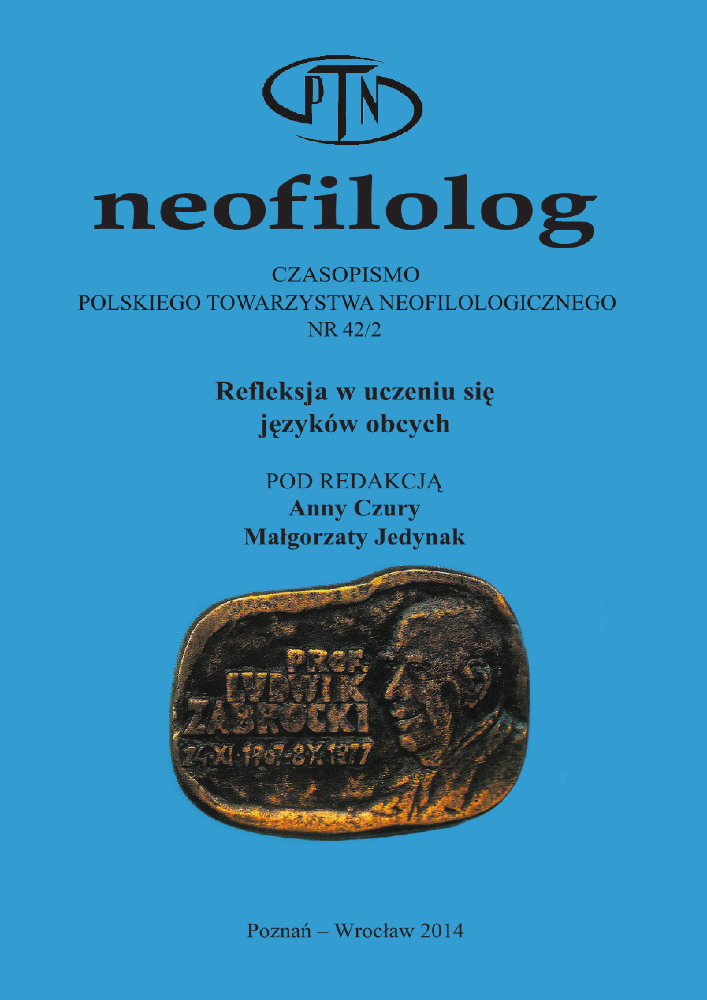Abstrakt
The Common European Framework of Reference for Languages is a document characterized by a high level of generality, addressed to a wide range of readers. The conceptual paradigm included in the document could constitute the basis for a new trend in language didactics; however, a lot of further work and research should be carried out for the new approach to achieve the status of independent and efficient methodology. The first prerequisite for introducing necessary modifications is a reflexive approach to the recommendations of CEFR, especially those which are methodological in character. The lack of any rules or procedures showing how to facilitate the achievement of learning objectives is the most frequent objection made against the CEFR. The focus on what has to be taught should go along with how to teach and why. Reflexivity which occupies a marginal position in the CEFR has to become a priority for its users if the methodology outlined there is to constitute the new era in language didactics.Bibliografia
Beacco, J.-C. 2007. L’approche par compétences dans l’enseignement des langues: enseigner à partir du Cadre européen de référence pour les langues. Paris: Didier.
Bronckart, J.-P., Bulea, E. 2005. „Coda: pour une approche dynamique des compétences (langagières)” (w:) Repenser l’enseignement des langues: comment identifier et exploiter les compétences (red. J.-P. Bronckart, E. Bulea, M. Pouliot). Lille: Presses Universitaires du Septentrion: 193-222.
Castellotti, V. 2002. „Qui a peur de la notion de compétence?” (w:) La notion de compétence en langue – Notions en questions 6 (red. V. Castellotti, B. Py). Lyon: E. N. S. Editions: 9-16.
Janowska, I. 2011. Podejście zadaniowe do nauczania i ucznia się języków obcych. Na przykładzie języka polskiego jako obcego. Kraków: Universitas.
Le Boterf, G. 2010. Construire les compétences individuelles et collectives. Paris: Groupe Eyrolles.
Perrenoud, Ph. 2011. Quand l’école prétend préparer à la vie... – Développer des compétences ou enseigner d’autres savoirs. Paris: ESF Editeur.
Rada Europy. 2003. Europejski system opisu kształcenia językowego: uczenie się, nauczanie, ocenianie. Warszawa: Wydawnictwa CODN.
Richer, J.-J. 2012. La didactique des langues interrogée par les compétences. Fernelmont: E. M. E. & InterCommunications.
Rosen, E. 2006. Le point sur le Cadre européen commun de référence pour les langues. Paris: CLE International.
Licencja
Prawa autorskie (c) 2019 Iwona Janowska

Utwór dostępny jest na licencji Creative Commons Uznanie autorstwa – Bez utworów zależnych 4.0 Międzynarodowe.
Przedstawiany utwór (artykuł) upubliczniany jest na podstawie umowy z autorem i na licencji Creative Commons Attribution-NoDerivatives 4.0 International (CC BY-ND 4.0).
Użytkownicy mają obowiązek podania wraz z rozpowszechnionym utworem, informacji o autorstwie, tytule, źródle (odnośniki do oryginalnego utworu, DOI) oraz samej licencji;
- bez tworzenia utworów zależnych,
- utwór musi być zachowany w oryginalnej postaci.
Uniwersytet im. Adama Mickiewicza w Poznaniu zachowuje prawo do czasopisma jako całości (układ, forma graficzna, tytuł, projekt okładki, logo itp.).
